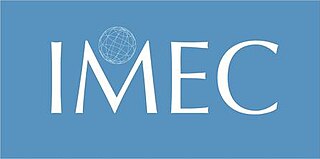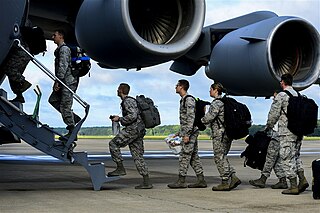
Médecins Sans Frontières, named Doctors Without Borders in English, is a charity that provides humanitarian medical care. It is a non-governmental organisation (NGO) of French origin known for its projects in conflict zones and in countries affected by endemic diseases. The organisation provides care for diabetes, drug-resistant infections, HIV/AIDS, hepatitis C, tropical and neglected diseases, tuberculosis, vaccines and COVID-19. In 2019, the charity was active in 70 countries with over 35,000 personnel; mostly local doctors, nurses and other medical professionals, logistical experts, water and sanitation engineers, and administrators. Private donors provide about 90% of the organisation's funding, while corporate donations provide the rest, giving MSF an annual budget of approximately US$1.63 billion.

Mercy Ships is an international charity based on Christian values that operates the largest non-governmental hospital ships in the world, providing hope and healing to Africa's most needy, community development projects, community health education, mental health programs, agriculture projects, and palliative care for terminally ill patients. Its headquarters are in Garden Valley, Texas.
Medical Emergency Relief International (Merlin) is a former British international non-governmental health charity which sends medical experts to global emergencies. In July 2013, Merlin merged with Save the Children.

Project HOPE is an international global health and humanitarian aid non-governmental organization founded in the United States in 1958. Project HOPE works in five main areas: disasters and health crises; infectious diseases; noncommunicable diseases; maternal, neonatal and child health; and health policy. The organization has been led by President and CEO Rabih Torbay since 2019.

The MV Africa Mercy is a 152 m, 16,572 GT hospital ship belonging to the humanitarian organization Mercy Ships. Converted from the rail ferry MS Dronning Ingrid in 2007, she is currently the world's second largest non-governmental floating hospital, following the organization's newest and largest ship, the MV Global Mercy.
Americares is a global non-profit organization focused on health and development that responds to individuals affected by poverty, disaster, or crisis. The organization addresses poverty, disasters, or crises with medicine, medical supplies and health programs.

International Medical Equipment Collaborative (IMEC) is a 501(c)(3) non-profit organization that provides medical equipment to doctors and nurses working hospitals and clinics in impoverished areas worldwide. IMEC is in North Andover, Massachusetts, United States, where volunteers sort, repair, package and ship donated medical supplies and equipment to international medical personnel. Through partnerships with various humanitarian organizations IMEC has been delivering medical supplies for 14 years. IMEC is known for providing medical supplies that doctors request for their patients.
PROJECT C.U.R.E. is the registered trademark of the Benevolent Healthcare Foundation, a 501(c)(3) non-profit, humanitarian relief organization based in Denver, Colorado. It is one of the largest nonprofit organizations in the world that delivers medical supplies and equipment to developing countries. Its main purpose is to collect and sort donated medical supplies and equipment from manufacturers, hospitals, and surpluses and then distribute the supplies and equipment to developing countries based on a needs assessment of the local hospitals and clinics in those countries.
IsraAID is an Israel-based non-governmental organization that responds to emergencies all over the world with targeted humanitarian help. This includes disaster relief, from search and rescue to rebuilding communities and schools, to providing aid packages, medical assistance, and post-psychotrauma care. IsraAID has also been involved in an increasing number of international development projects with focuses on agriculture, medicine, and mental health.

The humanitarian response by national governments to the 2010 Haiti earthquake included numerous national governments from around the world pledging to send humanitarian aid to the Haitian people. The United Nations Office for the Coordination of Humanitarian Affairs (OCHA) and ReliefWeb are coordinating and tracking this aid.

The humanitarian responses by non-governmental organizations to the 2010 Haiti earthquake included many organisations, such as international, religious, and regionally based NGOs, which immediately pledged support in the aftermath of the 2010 Haiti earthquake. Besides a large multi-contingency contribution by national governments, NGOs contributed significantly to both on-the-ground rescue efforts and external solicitation of aid for the rescue efforts.

Afya Foundation is a 501(c)(3) not-for-profit organization based in Yonkers, New York. It was founded in 2007 by Danielle Butin, MPH, OTR after a trip to Tanzania, where she encountered the dire circumstances and severely limited medical resources of their medical clinics. Afya, which means "good health" in Swahili seeks to spread "Good Health Through Giving," and does so by providing medical supplies, consumables, sustainable equipment, and community outreach supplies to international health clinics.
MedShare is a national non-profit organization that recovers surplus medical supplies and equipment from U.S. hospitals and manufacturers and redistributes them to needy hospitals in developing countries. They process these donated materials and make them available to under-served hospitals and clinics in two ways: direct shipments to international applicant institutions and supplying medical mission teams with commonly needed medical items.
Doc to Dock is a Brooklyn, New York-based 501(c)(3) non-profit organization that sends donated medical supplies and equipment to hospitals and clinics in Africa and Haiti. It was founded in 2005 by cardiologist and medical professor Bruce Charash.
A shipping container clinic is a type of shipping container architecture using intermodal containers as the structural element of a medical clinic that can be easily deployed to remote regions of the world. Shipping containers are ideal because of their inherent strength, wide availability and relatively low cost. In addition, and most relevant, shipping containers can be deployed anywhere in the world with the clinic already assembled within the container. This means pop-up clinics can be operational within days after deployment.

Operation United Assistance was a 2014 United States military mission to help combat the Ebola virus epidemic in West Africa, including the part of the epidemic occurring in Liberia. The 101st Airborne Division headquarters was responsible for leading the mission.
Esperança (non-profit), the Portuguese word for hope, is a registered 501(c)(3) based in Phoenix, Arizona, United States. Founded in 1970 by Luke and Gerald Tupper. It currently operates programs in Mexico, Nicaragua, Bolivia, Peru, Mozambique and Phoenix, Arizona.
Syrian American Medical Society is a non-profit, non-political, professional organization representing thousands of Syrian-American medical professionals in the United States that provides humanitarian assistance to Syrians in need. Since the Syrian Conflict began, SAMS has supported field hospitals, clinics, and surgical centers in Syria while assisting Syrian doctors, nurses, and health workers by paying salaries and providing training.

The Catholic Medical Mission Board (CMMB) is an international, faith-based NGO, providing long-term, co-operative medical and development aid to communities affected by poverty and healthcare issues. It was established in 1912 and officially registered in 1928. CMMB is headquartered in New York City, USA, and currently has country offices in Haiti, Kenya, Peru, South Sudan, and Zambia.
Not Just Tourists is a volunteer-led grassroots organization headquartered in Canada. Not Just Tourists collects surplus healthcare supplies in Canada, USA, and UK and sends them overseas as donations with tourists visiting low income countries.













